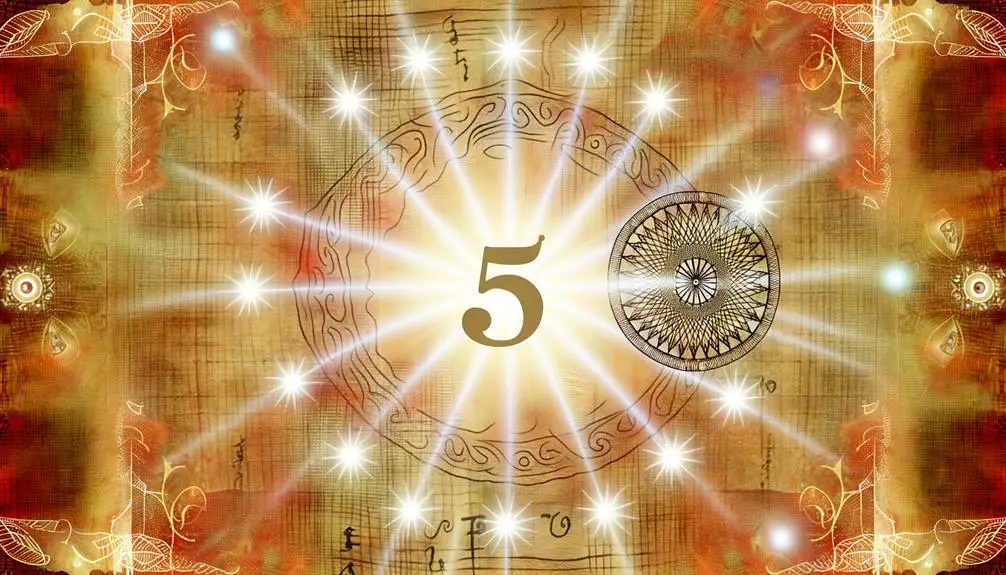Immerse yourself in the mystery of the number 5 in the Bible, where grace, redemption, and completeness converge, inviting deeper exploration.

Number 5 in the Bible
In the Bible, the number 5 stands as a symbol of grace, redemption, and completeness; it weaves through the fabric of Scripture, from the Pentateuch, embodying the Torah's foundation, to the five wounds of Christ that underscore His sacrifice.
You'll find its significance not just in the tangible, such as the five loaves that fed the multitudes, but also in the intangible, through the gifts of the Spirit and prophetic imagery. As you explore this intriguing numeral, you'll uncover layers of meaning that might just shift your understanding of biblical symbolism.
The question then becomes, how does this quintessential number influence the broader narrative and its teachings?
Key Takeaways
- The number 5 symbolizes grace, redemption, and divine sacrifice in biblical numerology.
- Jesus received five wounds during the crucifixion, highlighting the depth of his sacrifice for humanity.
- The Pentateuch, consisting of five books, forms the foundational core of Jewish faith and Christian theology.
- The Five Fold Ministry reflects the number's significance in establishing and guiding the church's spiritual and communal life.
The Pentateuch: Torah's Foundation

At the heart of the Torah lie the Pentateuch, five foundational books that establish the core tenets and narratives of Jewish faith and tradition. Traditionally attributed to Mosaic authorship, these texts not only recount the origins of the universe and humanity but also set forth the laws and commandments that define the covenant between God and the Israelites. This covenant's significance can't be overstated, as it shapes the identity and religious obligations of the Jewish people.
You'll find that the Pentateuch is meticulously structured, each book serving a distinct purpose within the broader narrative and legal framework. Genesis introduces the concept of a chosen people and the initial covenant with Abraham, while Exodus recounts the liberation of the Israelites from Egypt, solidifying their bond with God through the giving of the Torah at Mount Sinai. Leviticus, Numbers, and Deuteronomy further elaborate on the laws governing daily life, worship, and societal order, reinforcing the covenant's stipulations and the consequences of adherence or disobedience.
The notion of Mosaic authorship, while central to traditional Jewish and Christian thought, invites you to consider the profound implications of having a single, divinely inspired leader compile these texts. It underscores the unity of the message and the divine origin of the laws, enhancing their authority and the covenant's significance.
Understanding the Pentateuch through this lens allows you to appreciate its role as the foundation of Jewish faith, law, and identity. The covenant it describes isn't merely a set of obligations but a relationship with God, defined by commitment, responsibility, and divine promise.
Five Wounds of Christ

Delving into the crucifixion of Jesus Christ, you'll find that the five wounds he received—two in his hands, two in his feet, and one in his side—hold profound theological significance, symbolizing the full extent of his sacrifice for humanity's redemption. This vivid imagery of the Passion symbolism doesn't merely narrate a historical event; it delves deep into the fabric of Christian theology, presenting the Crucifixion significance as both a culmination and a divine intervention for the salvation of mankind.
Analyzing these wounds, you encounter a multifaceted symbol within Christian doctrine that intertwines with numerous biblical themes. The wounds in Christ's hands and feet, inflicted during his crucifixion, and the spear wound in his side, manifested post-mortem, aren't only physical but imbued with spiritual meaning. They serve as a testament to the physical reality of Christ's suffering and a signifier of his willingness to endure such agony for the sake of human sins.
Moreover, the number five itself carries weight within this context, often associated with grace and redemption in biblical numerology. Thus, the five wounds of Christ aren't randomly numbered but are inherently connected to a broader divine narrative of sacrifice and salvation.
In essence, the Passion symbolism and Crucifixion significance embedded within the five wounds of Christ offer a rich tapestry of theological insights. They serve as a constant reminder of the depth of Christ's sacrifice, underscoring the lengths to which divine love will go to redeem humanity. This analysis not only deepens understanding but also enriches faith, drawing believers closer to the profound mysteries of Christian salvation.
Creation and the Quintessence

Exploring further, the concept of quintessence in the context of creation offers an intriguing perspective on the biblical interpretation of the number five, revealing deeper layers of meaning in the fabric of existence. Quintessence, often referred to as the fifth element beyond earth, air, fire, and water, symbolizes the ether or the spiritual substance that permeates all things. This notion aligns with the biblical portrayal of creation, where divine order and cosmic balance are paramount.
In the narrative of creation, the number five emerges not just as a numeral but as a symbol of harmony and divine grace. It's through this lens that you can appreciate the meticulous design and the inherent balance within the cosmos. The earth's creation, detailed in Genesis, implicitly contains references to divine order, where every entity has its place, and every detail contributes to the cosmic balance.
The quintessence, then, represents not only the unseen force that binds the material world but also the divine spark that animates and sustains life. The integration of the number five into the creation narrative underscores its significance in maintaining the balance between the physical and the spiritual realms. This balance is crucial for the flourishing of life and the realization of divine purpose.
Therefore, the inclusion of quintessence in the biblical context of creation enriches our understanding of divine order. It invites you to contemplate the complexity and harmony of the universe, encouraging a deeper appreciation for the intricate ways in which the material and spiritual are interwoven, guided by a divine hand that ensures cosmic balance.
Five Fold Ministry Gifts

Transitioning to the concept of the Five Fold Ministry Gifts, we observe a profound embodiment of spiritual governance and edification within the Christian ecclesiastical structure. This framework is pivotal for fostering Church leadership and Spiritual empowerment, critical for the maturation and functionality of the faith community.
The Five Fold Ministry, as outlined in Ephesians 4:11-12, includes:
- Apostles: These are the visionary leaders who are tasked with establishing new congregations and ensuring the church's teachings remain pure and unaltered. They lay the foundational doctrines and are often seen as spiritual fathers and mothers.
- Prophets: They serve as God's spokespersons, delivering messages that offer correction, guidance, and encouragement. Their role is crucial in keeping the church aligned with divine will and in fostering an environment ripe for spiritual growth.
- Evangelists: Charged with spreading the gospel beyond the confines of the local church, evangelists are pivotal in recruitment and spiritual awakening. Their passion for salvation drives the church's missionary work, ensuring the message of faith reaches far and wide.
- Pastors: Also known as shepherds, they're responsible for the spiritual welfare of the congregation. Their role is to guide, nurture, and protect the members of their church, facilitating an environment where spiritual growth can flourish.
- Teachers: They dissect and impart biblical teachings, ensuring that the congregation understands and applies scripture in their daily lives. Their analytical approach to scripture is vital for doctrinal purity and spiritual maturity.
Together, these gifts ensure a balanced approach to church leadership and spiritual empowerment, fostering a community that's both grounded in faith and dynamic in its outreach.
Symbolism in Prophecy and Dreams

In the realm of biblical interpretation, symbolism in prophecy and dreams serves as a crucial conduit through which divine messages are communicated to humanity. These symbols, often cryptic and multifaceted, require a keen understanding for accurate dream interpretations and the deciphering of apocalyptic visions. The Bible is replete with instances where numbers, objects, and scenarios function symbolically to reveal God's will, judgment, or promises.
To deepen your understanding, let's explore some key symbols and their meanings:
Symbol |
Interpretation |
|---|---|
Water |
Life, cleansing, or chaos |
Fire |
Judgment, purification, or the Holy Spirit |
Lion |
Strength, courage, or Jesus as the Lion of Judah |
Bear |
Destruction, judgment |
Mountain |
Kingdom, authority, or a place of God's presence |
These elements aren't just random; they're imbued with rich theological significance. For instance, apocalyptic visions in the books of Daniel and Revelation are laden with symbols that represented future events and kingdoms. Dream interpretations, as seen through Joseph's and Daniel's experiences, unveil the significance of dreams in divine communication.
Approaching these symbols requires a blend of scriptural knowledge, historical context, and spiritual discernment. It's not just about the immediate interpretation but understanding the broader message God conveys to His people. Whether it's a warning, a promise, or a revelation of His character, the symbolic language in prophecy and dreams bridges the divine with the human, inviting you into a deeper exploration of biblical truths.
Frequently Asked Questions
What Is the Significance of the Number 5 in the Context of Biblical Numerology, Outside of the Direct References Found in Scripture?
In biblical numerology, you'll find that the number 5 symbolizes grace manifestation and divine balance. This significance goes beyond direct scripture references, diving into the analytical and scholarly interpretation of numbers.
You'll see that 5 often represents God's grace and the harmony within His creation. It's a detailed study, suggesting that every number holds a deeper meaning, with 5 uniquely embodying the grace and balance bestowed by the divine.
How Has the Number 5 Been Utilized or Represented in Ancient Israelite Rituals and Religious Practices Not Directly Related to the Torah or Christian Symbolism?
You're barking up the wrong tree if you're looking for direct ties to the Torah or Christian symbolism in ancient Israelite rituals.
However, the number 5 played a critical role through the concept of Five Offerings and in the dimensions of Sacred Architecture.
These practices, deeply rooted in tradition, showcase a scholarly blend of numerology and spirituality, with the number 5 serving as a cornerstone in their intricate, religious tapestry.
Are There Any Notable Figures or Stories in the Bible That Are Associated With the Number 5, but Not Connected to the Themes of the Pentateuch, Five Wounds of Christ, or the Other Specified Topics?
You're diving into a fascinating exploration beyond the well-trodden paths of biblical symbolism. Specifically, you're looking at instances like David's Stones, where he selected five smooth stones to confront Goliath, symbolizing divine support in overcoming obstacles.
Similarly, the Tabernacle Contributions highlight the community's collective effort in worship, where offerings were often grouped in fives, reinforcing themes of unity and faithfulness.
These examples underscore the nuanced representation of numbers in biblical narratives.
How Does the Concept of the Number 5 in the Bible Influence Contemporary Religious or Spiritual Beliefs and Practices Outside of the Traditional Christian Context?
You're barking up the right tree seeking how modern adaptations of spiritual symbolism, specifically the number 5, shape contemporary beliefs. This concept, abstracted from its biblical roots, influences diverse practices beyond traditional Christianity.
Its essence, symbolizing balance and harmony, permeates various spiritual movements, encouraging a holistic view of life. Analyzing these adaptations reveals their deep impact, showing how ancient symbols evolve, enriching modern spiritual landscapes with layers of meaning.
Can You Explore the Presence and Role of the Number 5 in Biblical Parables, Teachings, or Commandments That Do Not Fit Into the Categories of Creation, Five Fold Ministry Gifts, or Symbolism in Prophecy and Dreams?
You'll find the number 5 appearing in significant ways outside traditional realms.
For instance, the parable of the five loaves illustrates Jesus's ability to provide abundantly, feeding thousands with minimal resources.
Similarly, the parable of the five talents challenges followers to wisely utilize their gifts.
These instances aren't just stories; they're lessons in faith, responsibility, and the power of what seems insufficient, showcasing the deeper layers of biblical teachings.
Conclusion
In conclusion, you've journeyed through the profound symbolism of the number 5 in the Bible. From the foundational Pentateuch to the quintessential creation, the poignant wounds of Christ, the empowering Five Fold Ministry Gifts, and the enigmatic symbolism in prophecy and dreams. Like the five fingers on a hand, each aspect offers a unique grasp on the divine, interlocking to form a stronger understanding of spiritual truths.
This exploration isn't just an academic exercise but a call to deeper reflection and connection with the divine narrative.



Sign up